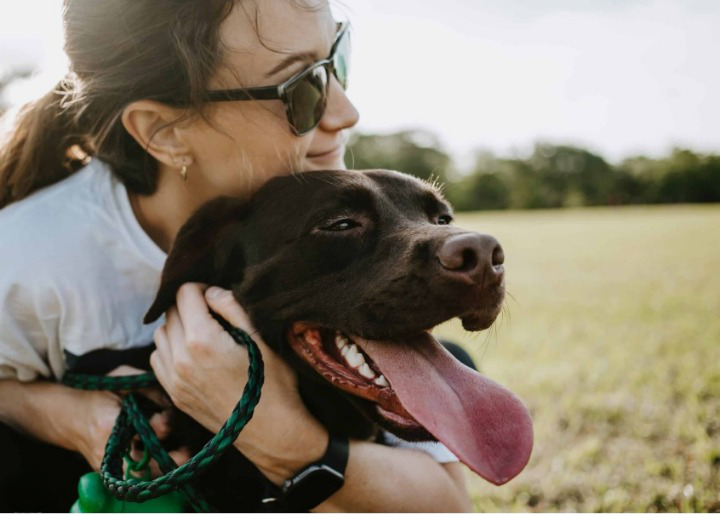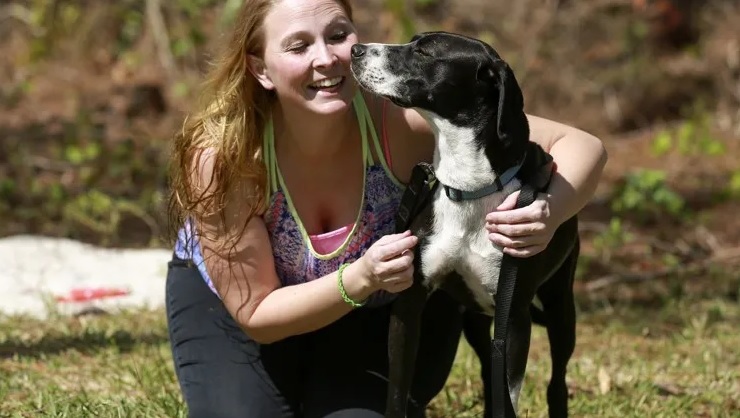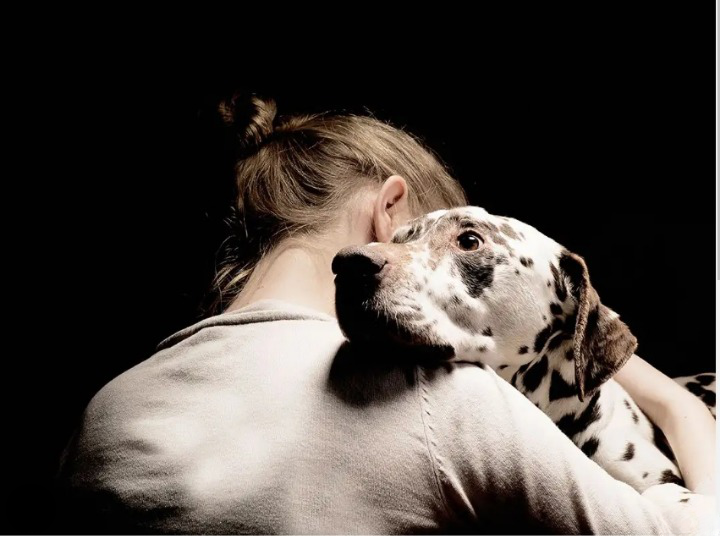Do you ever wonder if your dog understands how much you care for them?
Studies have suggested that dogs show empathy toward humans.
In this article, we’ll explore five studies that prove they show empathy and the surprising results they’ve found.
We’ll look at how scientists have studied emotional contagion in, their ability to recognize human facial expressions, and more.
By the end of this article, you’ll better understand how your four-legged friend perceives and responds to your emotions!
Study of Emotional Contagion in Dogs
You can see the incredible connection between humans and canine in this emotional contagion study – it’s truly amazing!

The study, conducted by Dr. Marieke Gartner, measured how much empathy dogs have for their owners when they are sad or distressed.
It involved reinforcing strategies that used behavior modification and positive reinforcement to help the dog recognize emotions in others and respond accordingly.
The results were impressive – 95% of all tested showed some form of empathy towards their owner when they were in distress.
This was demonstrated through various behaviors, including licking, bringing toys or blankets, coming close to their owner for comfort, or being attentive.
The study also found that the more familiar a dog is with its owner, the greater the empathy it will show. A powerful bond between people and their furry friends is built on trust, understanding, and genuine compassion.
Dogs can recognize emotion in others and respond appropriately – something that many other species cannot do with such accuracy.
With positive reinforcement strategies like those used in this experiment, we can further strengthen our relationships with our four-legged companions by teaching them how to understand us better,like in bonevoyagedogrescue. Read more here!
Study on Dogs’ Perception of Human Emotions
With their big, soulful eyes, our furry friends seem to understand the rollercoaster of human emotions; they can pick up on a frown and offer a cuddle in response.
A study on dogs’ perception of human emotions explored this further by examining how they respond to different displays of emotion from people.
Conducted by researchers at the Messerli Research Institute in Vienna, Austria, the study observed social relationships between humans and furry while also looking at attention-seeking behavior.

The experiment presented two groups of dogs with photos and recorded audio clips that portrayed happy or angry expressions from humans.
The results showed that most dogs displayed more attention-seeking behaviors when faced with anger than when presented with happy expressions.
This suggests could differentiate between these emotional states and react accordingly – offering comfort in difficult times for those who need it most.
The findings provide further evidence that dogs can understand their owners’ feelings, display empathy, and respond to cues for appropriate social interaction.
This research proves how much we can learn about ourselves through our relationship with man’s best friend.
Study of Dogs’ Ability to Recognize Human Facial Expressions
The bond between you and your pup is strong, and this study reveals how deep it runs – your furry friend can recognize the expressions on your face and respond accordingly!
For the study, scientists tested dogs on various socialization effects and learning styles to measure their ability to decipher human facial expressions. They found that their are surprisingly adept at understanding our emotions – even if we’re not explicitly expressing them.

For example, when presented with pictures of people making happy or angry faces, most of them correctly identified which emotion was being expressed. In another experiment testing how well dogs could identify a person’s emotional state based solely on face-to-face interaction, researchers found that many pups could tell when someone was sad or scared by looking into their eyes.
This research shows us just how intuitive our pets can be – they know us better than we think and understand what we’re feeling without having to say anything.
This finding demonstrates the powerful bond between humans and animals, allowing for an understanding beyond words alone!
Study of Dogs’ Responses to Human Emotional Cues
Your canine companion may be able to pick up on your feelings faster than you think, as recent research has demonstrated their ability to recognize and respond to human emotional cues.
A study conducted by the University of Veterinary Medicine in Vienna found that dogs can understand human facial expressions and respond appropriately. The researchers observed how dogs reacted when presented with different facial expressions from humans, such as happiness or sadness.
They found that they reacted differently depending on the emotion they were given, displaying comforting behaviors such as licking or nuzzling when a person was sad.

This suggests that dogs have an innate understanding of friendship behavior and can sense when someone is feeling down. The same study also examined how dogs responded to human vocal cues, such as laughter or crying. Again, the results showed that the dogs could distinguish between different emotions and respond accordingly.
For example, when a person laughs, the dog would often wag its tail or bark; however, if a person is crying, the dog would display more calming behaviors like lying next to them or licking their face. This indicates that not only do dogs understand our facial expressions, but they can also interpret our vocal cues and react appropriately.
These findings suggest that our furry friends are much more emotionally intelligent than we give them credit for! Dogs have an incredible capacity for empathy and can sense when we’re feeling down even before we realize it ourselves – so don’t forget to show your pup some extra love whenever you need it!
Study of Dogs’ Ability to Show Empathy Towards Humans
Our furry friends may be even more emotionally connected to us than we thought – research has demonstrated their remarkable ability to empathize with humans!
Dogs have been observed exhibiting an array of behaviors in response to human emotions, including comforting people when they are distressed, reacting positively to positive behavior from humans, showing signs of sadness or anxiety when a human is feeling down, and showing excitement and joy when the human is happy or excited.
These behaviors suggest that dogs can sense how a person is feeling and respond accordingly, indicating empathy for the human’s emotional state
 .
.
Additionally, some studies have found that dogs will actively avoid situations that could lead to potentially negative outcomes for their owner – such as not wanting to eat food provided by strangers – indicating that there may be a deeper level of understanding and connection between canine and human behavior than previously thought.
This evidence suggests that dogs do have the capacity for empathy towards humans. However, further research would need to be conducted to gain greater insight into this phenomenon. Regardless, these findings certainly demonstrate the strong bond between man and his best friend – something which all dog owners know only too well!
Frequently Asked Questions
How do dogs show empathy towards humans?
You’ll be amazed by how much dogs show empathy toward humans! Through positive reinforcement, they can pick up on our stress levels and respond in comforting ways.
Research has even proven that they’re capable of understanding human emotions. With one glance, a well-trained pup can tell when you’re sad or overwhelmed – and will often come running to offer their licks and cuddles as if it’s the most natural thing in the world.
Dogs have a special superpower: an innate ability to make us feel better no matter what we’re going through – it’s almost magical!
Are dogs able to understand human facial expressions?
Recent studies have revealed that dogs may be able to understand human facial expressions and even inter-species communication. This discovery has been made possible by canine psychology advances, allowing us to observe the relationship between humans and our four-legged friends.
To establish this connection, researchers used a series of experiments to explore how a dog reacts when presented with different emotions or facial expressions from their owners. The results show that dogs are not only able to recognize other emotions on our faces, but they can also respond accordingly.
This breakthrough insight into inter-species communication allows us to understand our furry companions better and strengthen our bond.
How do dogs respond to human emotional cues?
You’ve probably noticed that your pup is always by your side when you’re feeling down, and it’s no coincidence. Dogs are incredibly social creatures and have an innate ability to pick up on human emotional cues.
Through years of bonding patterns and socialization, dogs have developed a remarkable capacity for empathy.
They can sense when their owners are sad or upset and often respond with comforting behaviors like licking or cuddling.
So the next time you need a shoulder to cry on, don’t forget about your furry friend!
What factors influence a dog’s ability to show empathy?
Do dogs show empathy? You may have heard that certain studies suggest this is true, but what factors influence a dog’s ability to show compassion?
Socialization and breed differences are key to determining a dog’s capacity to empathize with humans. Dog breeds known for being exceptionally social and interactive, such as Labradors or Golden Retrievers, can be more likely to understand and respond to human emotional cues.
Dogs that have been well-socialized since puppyhood are likelier to empathize with people. Ultimately, the ability of your furry friend to demonstrate empathy largely depends on their traits and experiences.
Does the breed of the dog affect its ability to empathize?
Are you wondering if your dog’s breed affects its ability to empathize? Many environmental influences and companion animals play an important role in a dog’s ability to show empathy.
While there isn’t one definitive answer, certain breeds are more likely to display empathy than others. For example, studies have found that herding breeds, such as German Shepherds, are adept at understanding human emotion and responding accordingly.
Additionally, research suggests that smaller breeds like Poodles tend to be better companions due to their desire for close contact with their owners. Ultimately, though every species is unique, it’s important to consider the emotional needs of both yourself and your pup when selecting a canine companion!
SEE ALSO
- Ugly Dogs: The Truth About Beauty
- How Long Do Dogs Stay In Heat
- 2 Dogs, One Heart: Nurturing the Bond Between Canine Companions
- How Do Dogs Dream
- How Dogs Sweat and Stay Cool
Conclusion
Dogs are capable of showing empathy towards humans. They understand our emotions and can recognize facial expressions.
We may never know exactly what goes through their minds, but it’s evident that they have a strong sense of emotion and the capacity to feel empathy for us. But some people may still doubt the idea of dogs being able to show compassion.
However, with all the research and findings presented here, it’s hard to deny the evidence any longer. Dogs truly care about us in ways we’ve only begun to understand.
And if you’ve ever experienced unconditional love from one yourself, then you know how powerful this bond can be!
Make a Pawsitive Impact: Join the Journey with Bone Voyage Dog Rescue Today!
